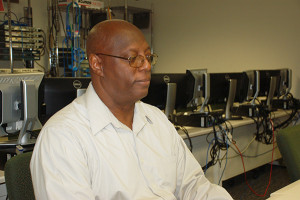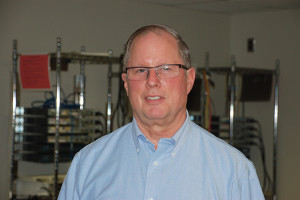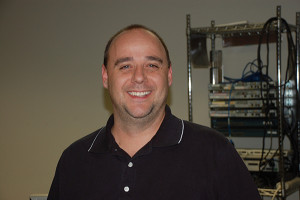Last updated on September 24, 2019
 For Ronald Stafford, going back to school to improve his information technology skills was a no-brainer. Stafford, who works the overnight shift as a computer operator at a Dallas-based national retailer, decided to attend Richland College to make himself more marketable in the IT industry.
For Ronald Stafford, going back to school to improve his information technology skills was a no-brainer. Stafford, who works the overnight shift as a computer operator at a Dallas-based national retailer, decided to attend Richland College to make himself more marketable in the IT industry.
Stafford said he sees his education as an “opportunity to grow in the company,” and he hopes the IT certifications he’s already earned will help him advance and work in the company’s network operations center.
 Information technology is one of the hottest industries in North Texas and nationally. Rod Lamb, lead faculty member for the Computer Information Technology program at the Dallas County Community College District, said CIT has been very successful across the district, especially for technically astute people. For example, Lamb said he had a student who was hired as an entry-level network administrator for a midsize company in Dallas with an initial salary of $50,000 a year. Lamb added that if this student earned an associate degree and other certifications, he would be eligible to make $85,000 annually – a relatively good salary for someone in his early 20s.
Information technology is one of the hottest industries in North Texas and nationally. Rod Lamb, lead faculty member for the Computer Information Technology program at the Dallas County Community College District, said CIT has been very successful across the district, especially for technically astute people. For example, Lamb said he had a student who was hired as an entry-level network administrator for a midsize company in Dallas with an initial salary of $50,000 a year. Lamb added that if this student earned an associate degree and other certifications, he would be eligible to make $85,000 annually – a relatively good salary for someone in his early 20s.
And job security exists in many areas of IT. Lamb said jobs in computer networking are not easily outsourced because they are very hands-on, and he added that the hiring trend seems to be on an uptick.
Lamb said students who come into the program learn the fundamentals of how networks are built, how the internet is built and how it interconnects everything. He said having those skills means that students who earn degrees and professional certifications can use that knowledge in almost any industry because most companies need to have their computer systems networked.
 Jason Alvarado, a digital forensics instructor in the CIT program, said Dallas is a great location for jobs in the information security field. “It is the highest-paying and hottest area to go into,” Alvarado said. “Dallas is kind of a hotbed for this kind of work right now.”
Jason Alvarado, a digital forensics instructor in the CIT program, said Dallas is a great location for jobs in the information security field. “It is the highest-paying and hottest area to go into,” Alvarado said. “Dallas is kind of a hotbed for this kind of work right now.”
Although getting professional certifications or a degree in IT can be a relatively quick way to advance or even change careers, the program isn’t for everyone. Lamb said that in addition to attending classes, students must read and work their way through long books filled with dense technical jargon. “Every one of our books is 500 pages minimum,” Lamb said. “It’s not like we’re going to hand out a 50-page pamphlet and say, ‘This is the course,'” he added.
Lamb said students must be prepared to study hard in order to succeed. He advised students to “make a plan, work the plan and never give up.” He added, “You’re going to have to give up some things outside of class. There’s studying that has to be done outside of class because there’s just no other way around it.” Lamb said many students enter the program, but they’re not willing to pay the price to succeed. Some of those students ultimately drop out.
Lamb stressed that students need to learn the fundamentals so they can understand the drastic changes in networking technology. “Until they understand what it is they’re dealing with, it’s tough to understand the advanced topics,” he added.
Lamb said professional certifications are vital for success in the IT industry. “We encourage all of our students to get certifications to go with the courses because that’s the truly marketable piece of the program,” he said, especially because “a lot of the technical courses are not transferable to four-year college degrees.”
“Most of our classes are centralized around professional certifications that hiring managers and employers are looking for them to have,” Alvarado said, adding, “It’s more important for me that students take a certification away from my course than a good grade on a final.”
Because of the rapidly changing landscape in technology, Lamb said many CIT students are not typical 18- or 19-year-old college students. Some are older and might have bachelor’s degrees, and they want to update their skills to advance their careers. Others are unemployed people who are trying to get an IT education quickly, Lamb said. “I’ve had grandmothers and grandfathers come through,” he added.
Stafford, 58, already had some college experience. “I thought it would be a good idea to try to get some certifications to go hand-in-hand with a degree and hopefully get the job that I really want,” he said.
Because of the nature of the program, there’s a mix of credit and continuing education students in Lamb’s classes. “We have credit students who are looking for certification and a degree, and we have continuing education students who are just trying to get certifications and technical knowledge to go along with a bachelor’s degree,” Lamb said.
Stafford said he has enjoyed the one-on-one style of learning, the collaboration with fellow students and the hands-on approach of the program. “I think this was a good opportunity to learn things rather quickly and make myself stand out, if I go in for a job interview,” he said. “A lot of companies are looking for people with up-to-date skills, and when you tell them you’re going to school and what you’re taking, it helps you get your foot in the door.”
More Information About Computer Information Technology at DCCCD
- For more information about the Computer Information Technology program, visit the program page of the DCCCD website. Courses in CIT are offered at all seven colleges in the DCCCD system; however, not all awards are offered at every college.
- To contact Rod Lamb, CIT lead faculty at Richland College, send an email to rlamb@dcccd.edu.
- Learn more about careers in the IT field with an education in Computer Information Technology.
